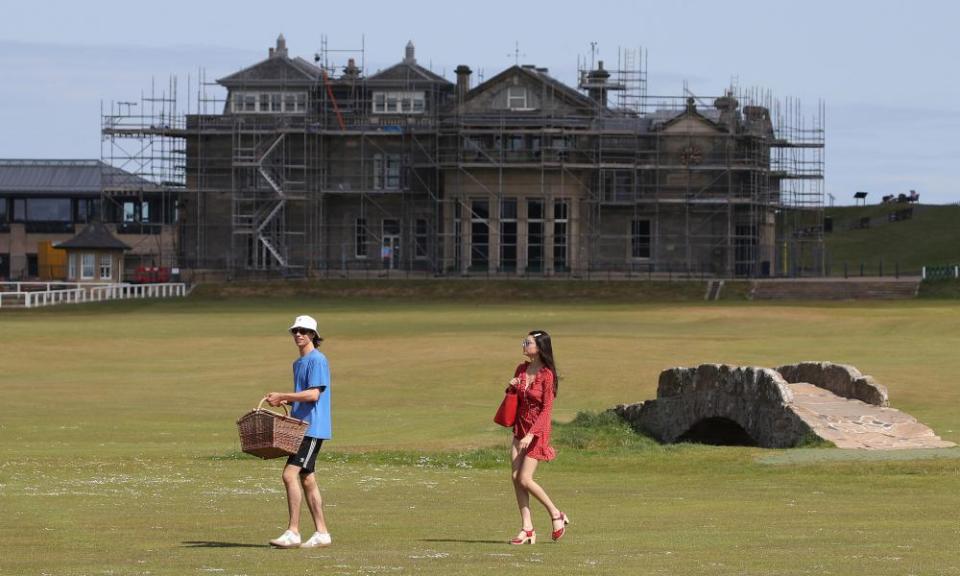People in Scotland allowed to meet with another household as lockdown eased

People in Scotland can meet outdoors with another household in groups of up to eight, Nicola Sturgeon said as she proceeded with phase one of the Scottish government’s four-stage plan for moving out of lockdown.
Scotland’s first minister insisted a continuing stay-at-home message remained “fundamental” to guidance, warning: “If we all start to go about our daily business too much, then we could see an increase in cases very, very quickly.”
The relaxations came as the Scottish government’s own “test and protect” contact-tracing scheme went live on Thursday across all health board areas.
Sturgeon said at her daily briefing that figures showed a “sustained and unmistakable” downward trend in coronavirus cases across Scotland, with the fourth weekly reduction in deaths as well as a fall of more than 80% in the number of new hospital admissions since the peak.
Reiterating that her approach to easing restrictions was “careful and cautious” – with the R number (reinfection rate) still in the range of 0.7 to 1 – Sturgeon said that, from Friday, Scots would be able to meet with members of one other household at a time. This must happen outdoors, in a park or private gardens, while observing physical distancing, with a maximum of eight people meeting at one time. There is also a strong recommendation not to meet more than one other household per day.
R, or the 'effective reproduction number', is a way of rating a disease’s ability to spread. It’s the average number of people on to whom one infected person will pass the virus. For an R of anything above 1, an epidemic will grow exponentially. Anything below 1 and an outbreak will fizzle out – eventually.
At the start of the coronavirus pandemic, the estimated R for coronavirus was between 2 and 3 – higher than the value for seasonal flu, but lower than for measles. That means each person would pass it on to between two and three people on average, before either recovering or dying, and each of those people would pass it on to a further two to three others, causing the total number of cases to snowball over time.
The reproduction number is not fixed, though. It depends on the biology of the virus; people's behaviour, such as social distancing; and a population’s immunity. A country may see regional variations in its R number, depending on local factors like population density and transport patterns.
Hannah Devlin Science correspondent
She gave the example of those who might want to host picnics or barbecues at the weekend, saying guests from the other household should bring their own food, cutlery, plates and cups.
People will be allowed to travel – preferably by walking or cycling – for recreation, with a suggested limit of five miles. Sitting and sunbathing in parks will be permitted, as will many outdoor non-contact sports where physical distancing is feasible, including golf, fishing, tennis and bowls.
In terms of business, most outdoor work that has been put on hold can resume and the construction industry can start site preparation. Garden centres and recycling facilities are also allowed to reopen, while takeaway and drive-through food outlets will no longer be discouraged.
From Monday, teachers can return to schools to prepare for the start of the new school year on 11 August, when pupils begin a “blended” model of at-home and in-school learning. From Wednesday, childminding services and fully outdoor nurseries will begin to reopen.
Insisting that she “trusted the judgment of the Scottish people”, Sturgeon admitted to feeling nervous about making changes, saying: “I worry that the limited changes we are making to these rules – the very careful changes – might lead to much greater change in reality.”
In particular, she urged people to change their plans if they arrived at beauty spots to find them crowded with other day-trippers over what is forecast to be a warm and sunny weekend.
From Thursday, if people in Scotland develop coronavirus symptoms they must immediately book a test by phone or online and isolate themselves – the aim is for all results to be returned within 24 hours. If the test is positive, the individual will then hear from a contact tracer who will ask them about recent face-to-face contacts, within their household or less than two metres away for 15 minutes or more.

 Yahoo Finance
Yahoo Finance 